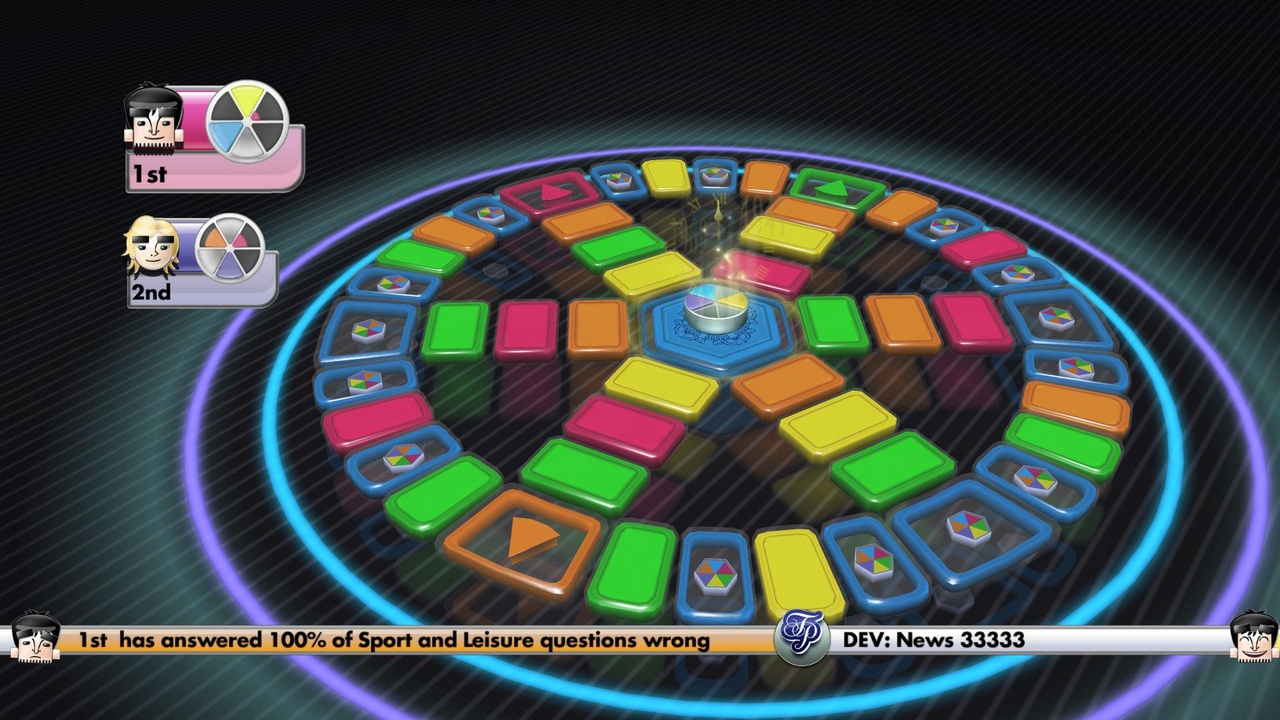It's hard to deny the joy in proving that you are the king of trivia. There is something inherently satisfying about dropping knowledge bombs on a variety of arcane subjects, and Trivial Pursuit has long been the arbiter in matters of trivia superiority. Electronic Arts' attempt to bring the hugely popular board game to the home console definitely captures the essence of the original game, packing in a ton of head-scratching questions that will leave savants and scholars alike gasping at their unexpected ignorance. However, though the trivia is as potent as ever, the overall package does little to take advantage of its newfound digital home. The lack of online multiplayer and the overabundance of geographic questions mean that there is little reason to play this version over any of the cardboard originals, and its high price makes it hard to recommend over comparable video trivia games already released.

There are three game modes in Trivial Pursuit. Classic mode follows the standard rules, where you must accumulate a pie wedge for each category. The ending rules have been tweaked, though, so that the active player chooses the final question category instead of having his or her competitors select it. Using the traditional method, would-be-champions would have to answer questions outside of their comfort zone, creating a tense and satisfying conclusion. In this version, the last question seems like little more than a victory lap. One new mode is called Clear the Board, a single-player quest to earn the most points while still collecting every pie piece. You can land on each space only one time, so answering a high percentage of the questions is necessary to achieve success. Though this mode is fun conceptually, playing Trivial Pursuit by yourself is lonely.
The final mode is called Facts and Friends, and it's a clever spin on the classic formula. Here, there is only one wedge for each category, which makes for a frantic fight for the most popular colors. But the strategy goes deeper than that. Before each question is asked, you bet if your opponent can answer it correctly, and you can even steal a piece if you know the answer but your opponent doesn't. There are also bonus spaces that let you steal pie pieces from other players or earn more points for every correct answer. This is by far the most exciting aspect of this game. Being able to pluck pie pieces from your buddies is rewarding, and snatching victory away from an overconfident friend in the waning moments scratches the evil itch deep inside the belly of every trivia fiend.
Trivial Pursuit isn't all thieving and griefing, though; there are plenty of questions to answer as well. The usual categories are on display--history, geography, literature, entertainment, sports, and science--with questions from as recently as 2008, along with more historic offerings as well. The questions are as cunning as you would expect, but the difficulty comes from an overreliance on geographic knowledge. Every category includes questions that require you to point to a map for the correct answer. Sure, you may know where the final Tour de France stage is held, but can you point out Paris on a map of France? There is no reason geography should be sprinkled so liberally in science and sports when there is an entire category already devoted to map expertise. Although that quirk makes this game more frustrating than the board game, the fact that every question has a multiple-choice answer makes the game ultimately lean toward the easy side. Even a blind baboon can guess correctly when there are only four choices, so victory may not feel as satisfying to some as it does in the board game.

The biggest problem with this digital port, though, is the lack of online multiplayer. Being able to challenge players outside of your living room would have added a compelling reason to play this over the standard board game editions, and its glaring absence makes this game a bad value. The single-player Clear the Board mode is a lousy alternative to having access to a world of trivia fans at the push of a button. Both the visuals and the audio are also lacking. Some questions include pictures of animals, cities, or notable objects, which adds a little life to the package. However, the rest of the game lacks frills. The announcer dishes out such clever lines as "I reckon your score is so big it can be seen from outer space," but he repeats himself far too often, so you have to listen to his inane observations dozens of times per match.
Despite its problems, Trivial Pursuit is still fun because the formula tickles the inner trivia nut in everyone. But this flat port of the classic board game doesn't do much to lure you away from the cardboard original. The lack of online multiplayer is a big missed opportunity, but even players content to play locally will run into some issues. The overabundance of geography trivia is a bit off-putting, and trivia buffs may not appreciate the easier multiple-choice format. Facts and Friends mode is a silly twist on the formula, but Trivial Pursuit is too expensive and uninspired to be worthwhile.